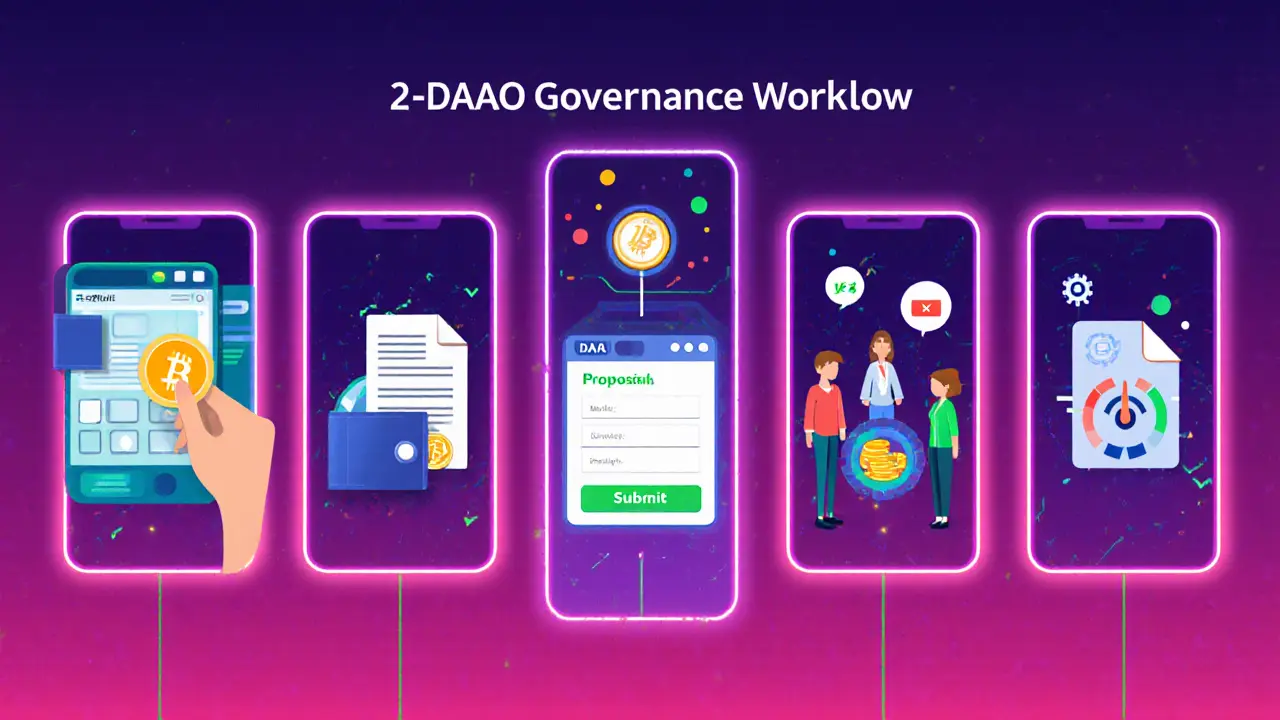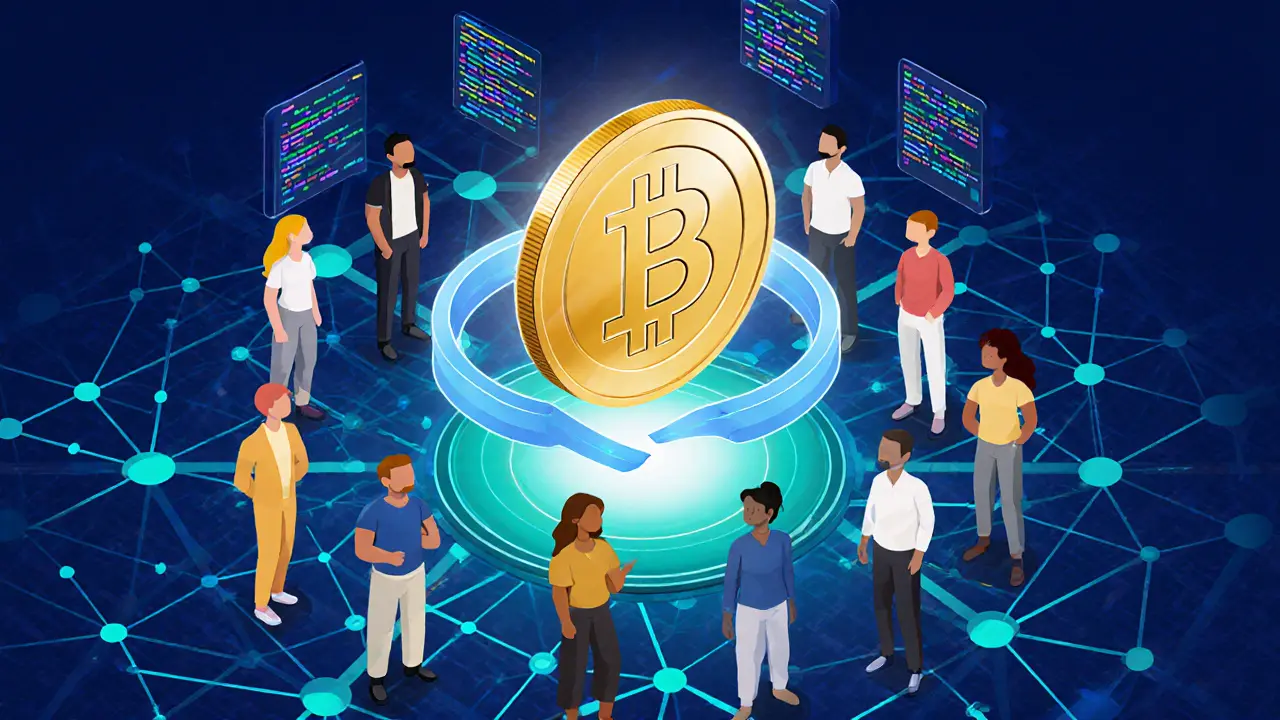DAO Governance Token Comparison Tool
Select options for both DAO and standard crypto coin, then click "Compare Features" to see detailed insights.
Quick Summary
- A DAO (Decentralized Autonomous Organization) is an organization that lives on a blockchain and follows rules written in smart contracts.
- Governance tokens give members voting power; they are not the same as regular crypto coins.
- Most DAOs run on Ethereum, but Polygon, Solana and others also support them.
- Key benefits are transparency and collective decision‑making; challenges include legal uncertainty and low voter turnout.
- Getting started means buying a DAO’s token, connecting a wallet, and voting on proposals via platforms like Snapshot.
What a DAO Really Is
When people talk about DAO (Decentralized Autonomous Organization) they are describing a member‑owned community that runs on a blockchain without a CEO or boardroom. All the rules - who can propose, how long voting lasts, what constitutes a quorum - are encoded in smart contracts. Once a contract is deployed, it executes automatically when the conditions are met, so no trusted middle‑man is needed.
How DAO Tokens Differ From Regular Crypto Coins
The token you buy to join a DAO is called a governance token. Holding it usually grants you voting power proportional to the amount you own. That’s unlike a typical crypto coin such as Bitcoin, whose main purpose is to store value or act as a medium of exchange. Governance tokens can also have economic utility - they might give you a share of the DAO’s treasury or allow you to earn rewards for participating in governance.
Core Technical Specs Every DAO Shares
- Decentralization: No single entity controls the organization.
- Smart‑contract execution: Rules are enforced by code on the blockchain.
- Full transparency: Every transaction and vote is publicly viewable.
- Token‑based voting: Members vote with governance tokens.
- Built‑in treasury: Funds sit in a multi‑sig wallet that only the DAO can move.
These specs were highlighted by legal experts in Utah and Wyoming in 2023 and have become the de‑facto checklist for new DAO projects.

Popular Blockchains for DAOs
Ethereum remains the dominant platform - over 80% of active DAOs launch there - because it has the most mature smart‑contract tooling. However, high gas fees pushed many projects to cheaper layers like Polygon or high‑throughput chains such as Solana. The choice of chain influences voting costs, transaction speed, and the ecosystem of tools available (e.g., Snapshot for off‑chain voting, Aragon for on‑chain governance).
DAO Governance Workflow - Step by Step
- Acquire the DAO’s governance token - either by buying on an exchange or contributing to the DAO’s funding round.
- Connect a compatible wallet (MetaMask, Trust Wallet, etc.) to the DAO’s voting portal.
- Submit a proposal using the DAO’s proposal module. Proposals can be anything from allocating treasury funds to changing a voting rule.
- Community members cast votes. Votes are weighted by token holdings unless the DAO uses quadratic voting or delegation.
- If the proposal meets the quorum and majority thresholds, the smart contract automatically executes the decision (e.g., transfers funds from the treasury).
This process usually spans 7‑14 days, which feels slow compared to a board meeting but ensures security and transparency.
Comparison: DAO Tokens vs. Traditional Crypto Coins
| Attribute | DAO Governance Token | Standard Crypto Coin |
|---|---|---|
| Primary Purpose | Enable voting & manage treasury | Store value / medium of exchange |
| Voting Power | Proportional to holdings (or quadratic) | None |
| Legal Treatment | Often viewed as security or membership interest | Varies; many treated as commodity |
| Typical Issuance | Fixed or community‑minted via proposals | Pre‑mined or algorithmic supply |
| Community Role | Active participation in governance | Passive holding |
Real‑World DAO Examples
MakerDAO governs the DAI stablecoin. Since 2017 it has processed over 250 proposals, each deciding on risk parameters that keep DAI pegged to the dollar. Uniswap DAO lets UNI token holders decide on fee structures and fund allocations. ConstitutionDAO showed how a DAO can rally millions quickly - it raised $47million in two weeks to bid on a rare U.S. Constitution copy, even though the bid lost.
On the flip side, the 2016 hack of The DAO (the first high‑profile DAO) resulted in a $60million loss and forced the Ethereum community to hard‑fork, creating Ethereum Classic. That incident underscores the security risks when smart contracts are not audited.
Benefits and Drawbacks Compared to Traditional Companies
Benefits: complete transparency (every vote is on‑chain), resistance to censorship (no single point of failure), and global participation - anyone with an internet connection can join.
Drawbacks: voting can be slow, token‑based power may concentrate in the hands of “whales,” and most jurisdictions have not defined clear legal frameworks. The U.S. SEC, for example, treats many DAO tokens as unregistered securities, which adds compliance risk.
How to Get Started with a DAO Today
- Identify a DAO that matches your interest - finance (e.g., Aave DAO), social (e.g., BanklessDAO), or service (e.g., Gitcoin DAO).
- Buy its governance token on a reputable exchange (Coinbase, Kraken) or earn it by contributing to the DAO’s work.
- Set up a Web3 wallet (MetaMask is the most common). Secure your seed phrase offline.
- Connect the wallet to a voting interface like Snapshot, Tally, or the DAO’s bespoke dashboard.
- Start with low‑stakes proposals - maybe vote on a funding round or community guideline. Observe how voting power is distributed.
Most newcomers spend 40‑60 hours learning the basics before they feel comfortable proposing. Community Discords and weekly calls are essential for speeding up that learning curve.
Future Outlook for DAOs
Industry analysts project the global DAO market to jump from $1.3billion in 2022 to over $23billion by 2030, a CAGR of nearly 44%. Legislative moves in Wyoming, Tennessee, and Colorado are making it easier for DAOs to register as legal entities, while the EU’s MiCA framework (effective 2024) offers the first comprehensive rules for DAO tokens in Europe.
Technically, upgrades like Ethereum’s “Prague” hard fork (2023) lowered gas costs for DAO actions by ~30%. Platforms such as Aragon are experimenting with quadratic voting and delegated voting to combat low turnout (average 3‑5% across major DAOs). By 2025, Gartner predicts that 10% of Fortune500 companies will have piloted a DAO for specific business units, though full replacement of corporate structures remains a longer‑term prospect.
Frequently Asked Questions
Is a DAO a cryptocurrency?
No. A DAO is an organizational model that runs on a blockchain. It often issues a governance token, which is a type of crypto asset, but the DAO itself isn’t a coin like Bitcoin.
Do I need programming skills to join a DAO?
You don’t need to code, but you should understand how to use a crypto wallet and be comfortable with on‑chain transactions. Most DAOs provide guides and community support for beginners.
What protects DAO funds from being stolen?
Funds sit in a multi‑signature treasury that requires several approved signatures before a transfer. Good DAOs also get their smart contracts audited by security firms.
Can I earn money by participating in DAO governance?
Some DAOs distribute a share of treasury profits to token holders or reward active voters with additional tokens. Earnings depend on the DAO’s economic design and the value of its assets.
Are DAO tokens regulated?
Regulation varies by country. In the U.S., the SEC often treats DAO tokens as securities, while the EU’s MiCA framework provides clearer rules for token issuance. Always check local laws before investing.


Author
Ronan Caverly
I'm a blockchain analyst and market strategist bridging crypto and equities. I research protocols, decode tokenomics, and track exchange flows to spot risk and opportunity. I invest privately and advise fintech teams on go-to-market and compliance-aware growth. I also publish weekly insights to help retail and funds navigate digital asset cycles.